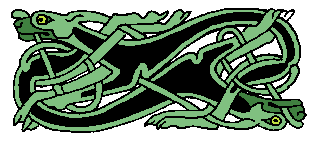![]()
![]()


![]()
BEFORE THE GATHERING
1. Obtain information regarding health care
resources in the local area. These should include local hospitals (find a couple
to minimize use of one ER), a local pharmacy that is willing to fill scripts called
from the patient's personal physician, an outpatient or minor trauma facility, ambulance
service, other emergency numbers (ie: Sheriff, Fire Dept., Poison Control.) Plan
for the worst that can go wrong and you will never be caught unprepared. (This information
can generally be obtained by calling the head nurse in the local ER and explaining
that you are providing health care coverage for a gathering and asking for the appropriate
local contacts and phone numbers. She is your ally, make yourself known to her before
you face her over an emergency.
2. Check the medical kit and obtain any additional
supplies which might be required. (Refer to the attached list for suggestions on
the most commonly used items.)
3. Plan schedule for daily "sick call".
Generally one hour in the morning and one in the afternoon should be sufficient.
Sick call should be staffed with medical professionals if available in order to triage
those patients who require more care then you are capable of providing on site.
4.
Coordinate with Registration Coordinator to send out forms to be completed by those
requiring medical care or special assistance during Merry Meet. The Registration
Coordinator should forward information regarding any individuals with medical problems
to the Health Care Coordinator as soon as they are recieved so that any necessary
arrangements can be made to insure their saftety and comfort.
5. Once you
arrive on-site, be sure to thoroughly inspect the site for potential hazards such
as poison ivy, unsafe structures, places where snakes might be present, etc. Mark
any such sites clearly with signs and/or cloth tape to keep people away. Also be
sure to look carefully at access routes which might need to be used to get an ambulance
or other emergency vehicle into the campgrounds in case of serious illness or injury.
DURING
THE GATHERING:
1. Coordinate with gathering security regarding emergency response
to accidents. Have an outline of the plan for emergency response made up and available
to be posted at key locations.
2. Place forms on registration tables at the
site to obtain health care volunteers. You are responsible for obtaining a list of
volunteers and for planning coverage for medical needs on a 24 hr basis. DONT TRY
TO DO IT ALL YOURSELF!! Before assigning volunteers to any coverage, sit down with
them and discuss their credentials and experience so that you become familiar with
them and their capabilities.
3. The Health Care Coordinator should carry a
radio and monitor it at all times and/or designate someone to do this for them. (The
person carrying the radio does not have to be a professional, only a person who can
assess the situation, render basic first aid, and summon assistance as needed) The
coordinator or another professional should be "on-call" back-up in case
the situation requires more professional levels of expertise.
4. Treatment
on-site should be limited to basic first aid and minor illnesses. Anything outside
of minor illness or injury should be referred to a physician for care. To do otherwise
places the care provider at risk in case of complications.
5. Any patients
seen at sick call should have documentation filled out. This provides a record of
care which can be useful if return visits are necessary or if the patient must be
transported to another treatment facility for care. It also provides a historical
record of the kinds of illness or injury treated to aid in planning for medical coverage
at future gatherings.
AFTER THE GATHERING:
1. Don't forget to
sit down after the gathering is over and assess the successes and failures of your
plan. What could you have done differently to provide better care? What unexpected
problems did you encounter? This kind of after-action evaluation will help you provide
better care at your next gathering.
![]()
![]()
Last Updated April 3, 1999